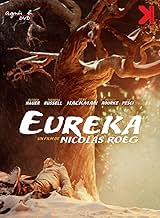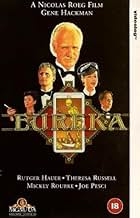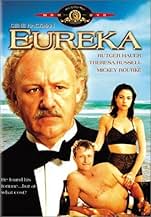IMDb रेटिंग
5.9/10
4.3 हज़ार
आपकी रेटिंग
अपनी भाषा में प्लॉट जोड़ेंIn 1925, a lone and obsessed Arctic prospector Jack McCann finally strikes gold. Twenty years later, he begins spiraling out of control when his only daughter becomes engaged to a man he str... सभी पढ़ेंIn 1925, a lone and obsessed Arctic prospector Jack McCann finally strikes gold. Twenty years later, he begins spiraling out of control when his only daughter becomes engaged to a man he strongly dislikes.In 1925, a lone and obsessed Arctic prospector Jack McCann finally strikes gold. Twenty years later, he begins spiraling out of control when his only daughter becomes engaged to a man he strongly dislikes.
- निर्देशक
- लेखक
- स्टार
- पुरस्कार
- कुल 1 नामांकन
फ़ीचर्ड समीक्षाएं
I too first saw this in London when it came out May 1983, at the Screen on the Hill. It was my O-level year, and I was a skinny, awkward 15-year-old, desperately trying to get into my first 18-rated film. It worked. But was it worth it? The film has an extraordinary opening section, as Gene Hackman finds the gold under the snow-encrusted earth, culminating in a spectacular, slow-motion explosion of rock and snow. Set to extracts of Wagner's DAS RHEINGOLD, it's unforgettable, thrilling cinema, and had my jaw dropping into my cappuccino. We also have the sight of a dying, half-frozen man blowing his brains out again and again, bringing to mind the disjointed, hallucinatory quality one recognises from the director of THE MAN WHO FELL TO EARTH and DON'T LOOK NOW. Stunning, disturbing stuff.
Unfortunately the momentum quickly slackens as we cut forwards in time to a rather dull, plodding melodrama about a Kane-like man who in his anguish says, "Once I had it all...now I only have everything." (Coming after the prologue, this also applies to the film itself.) There's some nasty scenes involving voodoo and Rutger Hauer doing something rather strange with a python, some gut-wrenching violence involving a blow-torch and the contents of a pillow, and a soap-opera court-room finale that feels as if it's wandered in from an entirely different film altogether. There are rumours of a different film lurking in this exuberant mess: one of the film's stars has hinted that it was not Roeg's final version that we saw. But I couldn't call this a success. Roeg fans should check it out as an oddity, but be warned: after the brilliant beginning, it's downhill all the way.
Unfortunately the momentum quickly slackens as we cut forwards in time to a rather dull, plodding melodrama about a Kane-like man who in his anguish says, "Once I had it all...now I only have everything." (Coming after the prologue, this also applies to the film itself.) There's some nasty scenes involving voodoo and Rutger Hauer doing something rather strange with a python, some gut-wrenching violence involving a blow-torch and the contents of a pillow, and a soap-opera court-room finale that feels as if it's wandered in from an entirely different film altogether. There are rumours of a different film lurking in this exuberant mess: one of the film's stars has hinted that it was not Roeg's final version that we saw. But I couldn't call this a success. Roeg fans should check it out as an oddity, but be warned: after the brilliant beginning, it's downhill all the way.
Eureka is an undertaking where the director has a vision and, against all odds, follows it through.The downside was the woeful distribution of the film on completion, resulting in lack of audience participation due to a delayed release and scant showings (it played in just two London cinemas); just goes to show that certain distribution companies are flummoxed when they have a unique picture to promote. Eureka boasts a great across-the-boards cast, with Gene Hackman giving his customary all in a driven and committed performance, ably supported by Theresa Russell, Rutger Hauer, Joe Pesci and in a minor role, Mickey Rourke. Director Roeg's use of locations, his skill in cutting, the harnessing of atmosphere and the adroit use of music add up to an intriguing whole, loosely based on fact. It was made at the start of the 80's after an astonishing run of films by Roeg.
Actually, this is a very quirky film, immersed in other things; in this case it is the Kabbalah. (This is made clear when Rutger Hauer wears a shirt with the Tree of the Kabbalah drawn on the front to a formal dinner in the middle of the film.) I found this release of the film both impressive and a let-down. It is impressive because of its ambition as a film; it is a let-down because (the way it is edited) most sense of "suspense" is replaced by puzzlement; this is The Zohar meeting Hollywood and suffering from the meeting. In the end, I don't feel this movie has any grand message for the world, except perhaps the pointlessness of having so much wealth if you don't do anything with it.
Overall rating: 7 out of 10.
Actually, this is a very quirky film, immersed in other things; in this case it is the Kabbalah. (This is made clear when Rutger Hauer wears a shirt with the Tree of the Kabbalah drawn on the front to a formal dinner in the middle of the film.) I found this release of the film both impressive and a let-down. It is impressive because of its ambition as a film; it is a let-down because (the way it is edited) most sense of "suspense" is replaced by puzzlement; this is The Zohar meeting Hollywood and suffering from the meeting. In the end, I don't feel this movie has any grand message for the world, except perhaps the pointlessness of having so much wealth if you don't do anything with it.
Overall rating: 7 out of 10.
Eureka is the kind of film you think you'll hate unless you give it a fair shake. It is a interplay between many characters, much like a soap opera. It works only if you take a general interest in the trivialities of each character. Jack McCann (Hackman) is the center of the film. His life is all about the gold he felt he earned, and the principle that he will never have any partners to share a percentage with. His life is ravaged by Mayakofsky (Pesci) and his henchmen. Charles Perkins, a friend of Jack's spent much of the movie trying to warn him that these men were dangerous. Jack's dilemma wasn't that he was waiting for his death, but the fact that he thought he was invincible. Being stubborn and set in his ways, Jack refused to give in to Mayakofsky. Jack was a man preoccupied with gold, but not loveless. He seemed to love all the women in his life. Also his daughter, Spacey Tracy. A loose young woman married to Claude (Hauer). Tracy had her head in the clouds, and wanted to live in a fantasy world. She did not provoke the fights between her father and Claude, but instigated them. She wanted Claude to fight as a proof of his love. Claude was most elusive. You never get his angle. If he loved Tracy or was just using her. She even used the witness stand as a way of finding out where Claude stood with her instead of pinning for the guilty ones involved in the tragic end of her father. (Claude did his own defense in court!) The movie has it's funny points. Like the dinner table scene at the McCann's where Jack makes some insulting remarks to the guests. Some of the best scenes involve Aurelio D'Amato, played by Mickey Rourke. He's cast in another glossed over film where he is perfect, but forgotten. D'Amato is a yiddish associate of Mayakofsky. And one of the main guys pestering Jack to sign the Luna Bay deal.(Mayakofsky wanted to build a casino on it.) There are scenes where D'Amato is begging Jack to sign. His baby face and soft voice should have gotten the devil to sign the document, but Jack wasn't so easy. Rourke's performance alone is reason enough to see this movie. And its not surprising he has a night with Tracy. Tracy loved Claude, but how could she resist D'Amato? Eureka is more of a film about the desires of man. Each character wants something, and they spend the entire film in pursuit of those things.
Of the Nicolas Roeg films I've seen thus far "Eureka" is in many ways the most conventional. Probably this is due to its being based on real-life events, to wit, the horrific murder in his palatial house of a powerful and super-wealthy man just as the Second World War is nearing its close.
Before we get to that, there's an eerie, atmospheric prologue set in the Yukon twenty years earlier where Gene Hackman's Jack McCann character achieved his one goal in life, to strike gold and become rich beyond his wildest dreams. Fast forward those twenty years and he's married to his now dissolute wife, Jane Lapotaire with an impulsive adult daughter, played by Theresa Russell, waited on hand and foot, living the life of luxury on his own private island in the Bahamas named Eureka after the word he uttered when making his lucky strike.
But of course, great wealth doesn't guarantee great happiness and so Jack's peace of mind is beset on two fronts. Firstly his impressionable daughter has fallen in with a handsome, libertine go-getter, Rutger Hauer's titled Frenchman Claude van Horn. Jack thinks Claude is literally a gold-digger and is provoked to extreme rage and violence against him when he learns the couple have secretly married. His other concern is that he's being pressurised by his up till now trusted business partner who's now in tow to a shady mobster who wants to open up Eureka to gambling, like a second Cuba.
How this self-made man confronts head-on both of these problems and the disastrous consequencies which follow, determines the outcome of the movie, culminating in his horrific killing and the subsequent trial of van Horn, the verdict coincidentally falling due on the day the war actually ends.
Like I said, this Roeg film is perhaps easier to follow than others in his catalogue, but naturally he throws in a few curve-balls along the way and elsewhere demonstrates his undoubted directorial bravura. The depictions of sex and violence are graphic, especially the drunken orgy scene masterminded by van Horn and the nightmarish slaying of McCann in his own bed but these are contrasted with the opulent depiction of the trappings of wealth and the matter-of-fact gravity of the extended courtroom trial.
I personally felt that rather like McCann himself, the film peaks at the moment he hits the motherlode, in a remarkably staged scene with McCann literally awash in his new wealth. There are strong performances by Hackman, and Hauer, in particular with Joe Pesci warming up on the sidelines for his future gangster roles under the direction of Scorcese.
Yes, the film is uneven with occasionally overripe dialogue and some confusing plot-shifts but it certainly works as a study of greed, power and the corruption of wealth.
Perhaps the moral here is that it's better just to let the rainbow fade rather than chase the pot of gold you imagine is at the end of it.
Before we get to that, there's an eerie, atmospheric prologue set in the Yukon twenty years earlier where Gene Hackman's Jack McCann character achieved his one goal in life, to strike gold and become rich beyond his wildest dreams. Fast forward those twenty years and he's married to his now dissolute wife, Jane Lapotaire with an impulsive adult daughter, played by Theresa Russell, waited on hand and foot, living the life of luxury on his own private island in the Bahamas named Eureka after the word he uttered when making his lucky strike.
But of course, great wealth doesn't guarantee great happiness and so Jack's peace of mind is beset on two fronts. Firstly his impressionable daughter has fallen in with a handsome, libertine go-getter, Rutger Hauer's titled Frenchman Claude van Horn. Jack thinks Claude is literally a gold-digger and is provoked to extreme rage and violence against him when he learns the couple have secretly married. His other concern is that he's being pressurised by his up till now trusted business partner who's now in tow to a shady mobster who wants to open up Eureka to gambling, like a second Cuba.
How this self-made man confronts head-on both of these problems and the disastrous consequencies which follow, determines the outcome of the movie, culminating in his horrific killing and the subsequent trial of van Horn, the verdict coincidentally falling due on the day the war actually ends.
Like I said, this Roeg film is perhaps easier to follow than others in his catalogue, but naturally he throws in a few curve-balls along the way and elsewhere demonstrates his undoubted directorial bravura. The depictions of sex and violence are graphic, especially the drunken orgy scene masterminded by van Horn and the nightmarish slaying of McCann in his own bed but these are contrasted with the opulent depiction of the trappings of wealth and the matter-of-fact gravity of the extended courtroom trial.
I personally felt that rather like McCann himself, the film peaks at the moment he hits the motherlode, in a remarkably staged scene with McCann literally awash in his new wealth. There are strong performances by Hackman, and Hauer, in particular with Joe Pesci warming up on the sidelines for his future gangster roles under the direction of Scorcese.
Yes, the film is uneven with occasionally overripe dialogue and some confusing plot-shifts but it certainly works as a study of greed, power and the corruption of wealth.
Perhaps the moral here is that it's better just to let the rainbow fade rather than chase the pot of gold you imagine is at the end of it.
I remember watching this movie a couple of times on cable over a decade ago. I don't know if it was supposed to be a mystery or noir but one of the things that struck me was the poor picture (perhaps it was intentional to keep up the mystery)
Generally, the actors did a very good job. I just feel the script was poor.
क्या आपको पता है
- ट्रिवियाDirector Nicolas Roeg has said of this movie: "I was initially interested in a character who wanted to satisfy an all-consuming desire...'that's what I want'...but when he gets it what happens after his brief ecstatic moment? Nothing more than left over life to kill."
- गूफ़Jack McCann's discovery of the gold is several times said to take place in the winter of 1925. At this time, McCann has no family and is a complete loner. Yet, when the film moves forward to 1945, he has a married daughter who is said to be twenty years old in the early part of 1945. Her mother, McCann's wife, is an aristocratic Englishwoman who has married him for his money, and who therefore cannot have married him before 1926 at the earliest, which makes the daughter unlikely to be more than 18 in the 1945 scenes. Theresa Russell, who plays the daughter, was in her late twenties when the film opened.
- भाव
Jack McCann: Once I had it all. Now I just have everything.
- इसके अलावा अन्य वर्जनAlthough the UK cinema version was intact the 1986 Warner video release was missing 7 seconds from the death of Jack McCann, notably shots of a flame thrower being run over his body and face. These were not cut by the BBFC so presumably they were distributor edits. DVD releases are fully uncut.
- कनेक्शनFeatured in Loose Talk: एपिसोड #1.7 (1983)
टॉप पसंद
रेटिंग देने के लिए साइन-इन करें और वैयक्तिकृत सुझावों के लिए वॉचलिस्ट करें
- How long is Eureka?Alexa द्वारा संचालित
विवरण
- रिलीज़ की तारीख़
- कंट्री ऑफ़ ओरिजिन
- आधिकारिक साइट
- भाषा
- इस रूप में भी जाना जाता है
- River of Darkness
- फ़िल्माने की जगहें
- उत्पादन कंपनियां
- IMDbPro पर और कंपनी क्रेडिट देखें
बॉक्स ऑफ़िस
- US और कनाडा में सकल
- $1,23,572
- दुनिया भर में सकल
- $1,23,572
इस पेज में योगदान दें
किसी बदलाव का सुझाव दें या अनुपलब्ध कॉन्टेंट जोड़ें

































